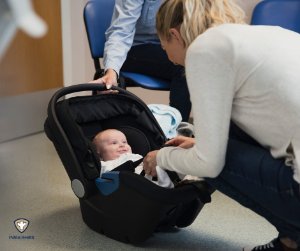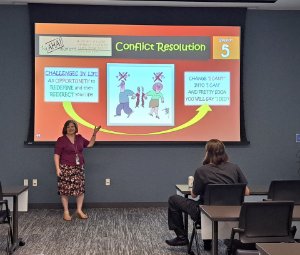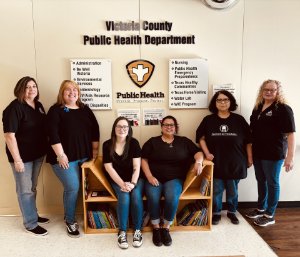County Magazine | July 29, 2024
Parenting programs make a big difference, one class at a time
Counties help parents through critical stages of child-rearing

Connect program helps new parents with postpartum
health and infant care. (Credit: Victoria County)
It’s not easy raising kids these days. Maybe it never has been. But there are county-run classes that can help.
In some counties, parents are required to take virtual or in-person parenting classes as part of a court order, sometimes as part of a divorce agreement, but there are also options for parents who simply want to be better parents, no matter their situation.
Travis County: Helping individuals learn to co-parent
For divorced or separated parents, Travis County launched its co-parenting class program in 2000, when guardians ad litem, the court-ordered advocates in child custody cases, asked for an educational tool to help parents who were fighting over their kids and to keep them out of court. They came up with a six-course curriculum that was so popular it’s still in use today.
“Courts and CPS can mandate that parents take these classes, attorneys can recommend it, and some parents just search it online and find out about them,” said Sandra Patterson, the training education coordinator for the Travis County Domestic Relations Office. A former teacher, Patterson came out of retirement to take the job in 2020, and today, she hosts three classes a week for the dozens of parents who are enrolled at any given time.
Participants previously had to pay $60, but now the course, offered online and in person, is free and open to anyone, even outside Travis County, no matter the age of the children.
The Travis County co-parenting classes aim to keep families off of the court docket, saving families thousands in attorney’s fees and teaching them how to keep their children’s best interests in mind and to think with their head, not just their heart.
“These classes change outcomes for families,” Patterson said. “Parents are finally able to work together.”
Last year, she recalled a story about two recently divorced participants who were able to take their kids trick-or-treating together. “It was the first time they’d done something with their child together.”

coordinator for the Travis County Domestic
Relations Office, teaches co-parenting
classes free of charge to individuals living in
and out of Travis County. (Credit: Travis County)
Patterson also taught the class to inmates at the Travis County Correctional Complex. “One of the inmates was reading the guide to his co-parent over the phone.” She’ll teach two more rounds of the class at the jail later this year.
Victoria County: Supporting parents in newborn phase and beyond
In Victoria County, Angie Stafford runs two parenting programs through the county’s Public Health Department: Parents as Teachers and Family Connects. The county launched the programs through the Texas Department of Family and Protective Services’ Prevention and Early Intervention Division.
“We are finding that more and more parents are looking for this kind of education. They say, ‘I knew what kind of childhood I had, and I don’t want my kids to experience that. I want to do more than survive with my children,’” Stafford said.
Parents as Teachers, which operates in more than 40 Texas cities and counties, is a long-term program in which parent educators visit families twice a month for two years. During these sessions, educators present lesson plans for parents to engage in activities with their children, promoting positive interactions and building fine motor skills that are essential for school readiness. “The educators become part of the family. It does get very emotional when the two-year period is over.”
More than 100 families have been part of Victoria County’s program during the seven years since it launched, with 55 currently enrolled. The team started with two parent educators and now has four. Families that receive aid from the federal supplemental nutrition program for women, infants and children, known as WIC, automatically qualify, but there are other at-risk determinants, including low educational attainment, teen pregnancy, addiction and having someone in the military.
For new parents in Victoria County, the Family Connects program has registered nurses conduct a one-time visit with new mothers three weeks after they are discharged from DeTar Hospital Navarro.

visiting programs within Victoria County,
Parents as Teachers and Family Connects, which are
designed to build stronger parent child interaction
and minimize abuse and neglect. (Credit: Victoria County)
Nurses do an overall health assessment for issues such as high blood pressure in mothers or heart murmurs in newborns, and check to make sure that the environment is safe. They talk with parents about additional resources that might be available for them, depending on their situation.
They also bring a care package for both the baby and the mom that might include lotion, lip balm or a bubble bath for mom and diaper rash cream and bottle brushes for baby. “Just like every pregnancy is different, every child is different, and moms find it very comforting to have someone check in on them,” Stafford said.
Family Connects, which operates in seven Texas cities and counties, helps families avoid unnecessary emergency room visits and educates parents about issues such as postpartum depression and infant care.
“We observe where they sleep and watch them swaddle their babies and make sure they are getting the right ratio with formula,” Stafford said. “These visits are important no matter if it’s your first child or your fifth.”

